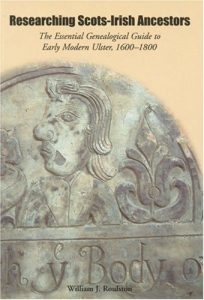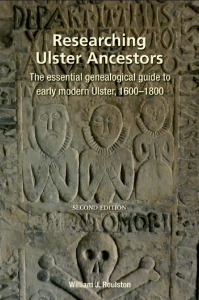Seven years ago, when the fourth edition of Tracing Your Irish Ancestors came out, Claire Santry didn’t review it, she weighed it. I loved the gesture and I’ve always wanted to find a book for which I could do the same. Step forward William Roulston’s Researching Scots-Irish Ancestors (2nd edition 2018).
 The first edition (a svelte ¾ lb, born in 2005) has long been essential for anyone trying to crack those toughest of Irish genealogical nuts, pre-1800 Ulster Presbyterians. They flooded across the Atlantic throughout the eighteenth century and peopled Pennsylvania and Appalachia with astonishing fecundity. As a result, many, many Americans have Scots-Irish in their tree.
The first edition (a svelte ¾ lb, born in 2005) has long been essential for anyone trying to crack those toughest of Irish genealogical nuts, pre-1800 Ulster Presbyterians. They flooded across the Atlantic throughout the eighteenth century and peopled Pennsylvania and Appalachia with astonishing fecundity. As a result, many, many Americans have Scots-Irish in their tree.
Before William’s first edition, when asked to research them, I would tend to stare at my shoes and mumble something about lack of records. With his book to hand, at least I could be clear about what I didn’t know. And now the second edition makes my ignorance pinpoint accurate, weighing in at a strapping 2 lb.
 The format is very similar, with chapters on each topic carefully subdivided into numbered subsections, making navigation as easy and intuitive as possible. The familiar categories in the first edition – Church records, Gravestones, Seventeenth Century, Eighteenth Century, Estates, Deeds , Wills, Elections, Military and Newspapers – are all retained and expanded to include material uncovered or accessioned since 2005. In addition, five new sections are added; Migration records; Education, Charity and Hospital Records; Business and Occupational records; Organisations and Societies; Diaries and Memoirs.
The format is very similar, with chapters on each topic carefully subdivided into numbered subsections, making navigation as easy and intuitive as possible. The familiar categories in the first edition – Church records, Gravestones, Seventeenth Century, Eighteenth Century, Estates, Deeds , Wills, Elections, Military and Newspapers – are all retained and expanded to include material uncovered or accessioned since 2005. In addition, five new sections are added; Migration records; Education, Charity and Hospital Records; Business and Occupational records; Organisations and Societies; Diaries and Memoirs.
As in the first edition, the appendices make up more than half the book, almost 350 pages out of a total of 600. And, as before, they are what make the book absolutely essential: the hundred-page county-by-county listing of Ulster estates and their records is worth the price of the book on its own. This is not a how-to, it’s an extraordinary encyclopaedia of historical Ulster, and a wonderful achievement.
There are a few tiny bones to pick. First, I’d love to see William’s take on nineteenth-century records. The cut-off at 1800 seems a bit limiting.  Second, the book, very strangely, has two titles, called Researching Ulster Ancestors in the UK and Researching Scots-Irish Ancestors elsewhere. Why? Though Ulster Scots are inevitable the prime focus, the records covered are blind to tribal affiliation.
Second, the book, very strangely, has two titles, called Researching Ulster Ancestors in the UK and Researching Scots-Irish Ancestors elsewhere. Why? Though Ulster Scots are inevitable the prime focus, the records covered are blind to tribal affiliation.
And third, the book was published just after my own fifth edition went to the publisher, so I couldn’t plunder all the new material. Curses, foiled again.
Received my copy this week and have been spending lots of time with it open beside my keyboard. I, too, wish for a few years past 1800 but what a wonderful help this is researching those pesky Scots-Irish.
Received my copy this week and have been spending lots of time with it open beside my keyboard. I, too, wish for a few years past 1800 but what a wonderful help this is researching those pesky Scots-Irish.
As I’m sure you know, the title is different for two markets. Yanks over here researching their Northern Ireland roots tend to call themselves “Scots-Irish.” Most Americans don’t even know what “Ulster” means. And come to think of it, the average American probably thinks “Scots-Irish” just means one has ancestry from Ireland and Scotland on separate pathways, without any ancestral junction in Northern Ireland. I agree it’s a confusing name, but that’s what we’ve got to deal with.
John, When will your fifth edition be available?
Many thanks.
March next year, I think.
I would love to get a copy, but fear that at 2 pounds in weight, I could not afford the postage!
lots of websites have no extra charge for postage eg http://www.bookdepository.com/Tracing-Your-Irish-Ancestors-John-Grenham/9780717150243?a_aid=offers
My family were Catholic and started emigrating to the US in 1816, although scads of Presbyterian Harbisons came over in the 18th century. The question I have is this; does he say anything about Scots immigrants to Ulster who arrived before 1610? There appears to have been a lot of traffic back and forth prior to the flight of the earls, but very little research on it, and I’m at least considering the possibility the Catholic Harbisons might have been in Ireland before the Plantation of Ulster. The Y-haplogroup is completely different.
On Scots-Irish; yeah, they coined the term to distinguish themselves from the famine Irish. Relations between Catholic and Protestant Ulstermen in Philadelphia in the 19th century were about what you’d expect.